- Home
- Fay Weldon
The Heart of the Country Page 3
The Heart of the Country Read online
Page 3
‘That’s nothing to do with it,’ said Natalie. And it wasn’t, though it should have been. How many meals have you taken, do you think, when there’s been something going on between your partner and A. N. Other that you haven’t known about? Don’t to this day? What winkings, glimmerings and nudgings? Doesn’t bear thinking about. Could quite put you off your food.
‘What, then? Hubby hot on the trail?’ He was concerned. He had kind, thoughtful eyes, for a villain. He made love beautifully, gently, commandingly, unerringly and altogether without doubt, as it were, as to his capacity for his pleasure or his partner’s – though always, of course, in something of a hurry in case his wife came back.
‘I don’t think so,’ said Natalie, but she did wonder. Perhaps Harry had found out, taken offence, taken off. What then? But she couldn’t admit it; nor could she understand the phenomenon of her sexual reluctance. As well take off her clothes now for Arthur as take them off in Wells Cathedral in the middle of Sunday Service! She was afflicted, in fact, by superstitious dread. If she put another foot wrong the ice might crack; she’d go through, go under, drown. It might indeed be true that Harry was no more, that six-thirty would come and go and he not appear: not a trace of him left behind – except the children, that is. She must reassemble herself in her own head as an ordinary, faithful wife to which untoward events did not occur. Then surely everything would be all right. Oh yes, wife and mother Natalie, neat and clean, looking out of the mirror back at her complacent self. Smile for the camera, Natalie! Good Natalie! Keep your fingers crossed, not to mention your legs!
You wonder how I know all this? What goes on in one woman’s head goes pretty much on in another’s, or else why can doctors (male) ask their ritual questions about hormonal levels – viz: Do you feel murderous before your period or after your period, madam? – and feel safe in prescribing dangerous drugs according to your answer?
We are all of us part of one bleeding body, if you ask me.
So Natalie went home from Arthur’s with her hair unruffled and her skirt unlifted, leaving Arthur puzzled, but at least able to get on with filling in his VAT forms. And as it happened Jane came back from school almost as soon as she’d arrived, the teachers having called a one-day strike in the furtherance of a pay claim, and ventured to surprise her husband in the back room. But she found him just sitting there, all innocence.
Whew!
‘I’m mad,’ Jane told herself. ‘Paranoid. I need treatment. Why do I have these neurotic fantasies that my husband’s being unfaithful to me? It must be something to do with my relationship with my father.’ She went to group therapy on Monday evenings. Arthur had a WAEADA meeting at the same time. He was a leading member, along with his friend Angus, of the West Avon Estate Agents, Dealers and Auctioneers.
Unfaithful! What an absurd word – a concept, not the description of an act. Yet it’s the concept that does the hurting, not the deed itself. Does infidelity as such matter? Jane going round breaking plates matters; Jane’s hair going grey before its time matters; Natalie not caring about the way she makes Jane break plates matters; the way both women use Arthur to reinforce their view of themselves matters. But Natalie leaning her head against Arthur’s Antiquax-impregnated jacket and receiving comfort – that matters too, righting scales, and so does the excitement and the thrill of adultery – they matter. They’re wonderful. Doesn’t Natalie’s pleasure somehow make up for Jane’s grief?
No wonder I, Sonia, am shut up in a madhouse waiting, even as I write, for an injection to stop me twitching and shouting. Trying to establish a moral framework for our existence, to decide exactly who to blame for what, and why, is enough to drive a sane woman mad, and a mad one even madder. In the meantime just accept that though I’m diagnosed as both insane and dangerous, and am a convicted arsonist, my intentions are of the best. My search after truth is absolute. In the telling of this story I am bending over backwards to be fair to absolutely everyone.
So, the wages of sin and the pleasures of adultery now discussed if not quite settled, let’s get on with the story.
I’ll try and keep out of it, I promise you, except in the third person.
Dinner
Natalie didn’t tell the children anything about the rumour that their father had run off with a beauty queen. She was not that kind of mother. Now me, I used to tell my children everything, because there was no one else to tell and I’m a blabbermouth. This may be part of the reason they’ve taken the children away from me. People think kids ought to be spared the truth: it really upsets them when they’re not. Though I don’t see why the mere fact of their childhood should earn them this special concession. What happens happens; and when the bailiffs come what’s the use of telling the children it’s the ratcatcher? The television goes and the rats stay, and the kids are the first to notice. But that’s another story.
What Natalie did, on the way home from Coombe Barrow School, was to pass me, Sonia, filing home with my three little girls, Teresa, Bess and Edwina. And she actually stopped to give us a lift. Too late for me to lift the curse, of course, but better than nothing.
Young Ben was horrified at his mother’s act of kindness. Young Ben, at twelve, looked like his father, admired his father and made a special effort to be like his father. He had really enjoyed life in the Gambia, where Harrix had operated when he was small. But then his father had packed up and come home rather suddenly: it doesn’t do in some countries to leave too many bills unpaid. Ben had really appreciated swimming pools and servants and the sense of superiority that being white gives a child. (It had just made his mother feel too hot and absurdly pink and sweaty). Alice had been rather more in favour of coming home. Alice was a softie: she’d wept at the sight of flies crawling over babies’ eyes.
‘They’re not like us,’ Ben would say. ‘They don’t feel it. Do shut up, Alice.’ But she hadn’t. Now, back in England, she wept at the thought of battery hens, though she went on eating chicken. What it came down to was that Alice would weep at anything. Some will, some won’t. Ben was right: she was a softie.
Now picture the scene, as I try to, impartially. (Practise looking in, my psychiatrist says, on your own life. Not looking out. See yourself as others see you!) Teresa, Bess and Edwina piled into the back seat next to Ben and Alice, and Sonia eased her pneumatic bulk in next to Natalie. Sonia didn’t eat more than anyone else. Honestly. It was just depression and unhappiness made her blow up. (I know what he’s going to say even before he says it. ‘Blow up?’ my shrink will say. ‘Interesting you should use that word. Perhaps what you’re talking about is not depression after all, not unhappiness, but rage.’ Too bad!) Right or wrong, and be that as it may, Sonia, once an eight-stone stripling, was now a twelve-stone bubble. Now let’s overhear the conversation.
‘This is good of you,’ said Sonia, trying not to sound sarcastic. ‘I suppose the dog is all right with the children?’ Jax, who usually looked steadfastly out of the back of the car, had turned his head to look at the invaders of his territory and was baring his teeth.
‘Perfectly all right,’ said Natalie, her eyes on the road.
‘He’s baring his teeth,’ observed Sonia.
‘That’s only his smile,’ said Natalie, wondering why she had bothered to pick up Sonia. That ‘the underprivileged were always ungrateful’ was one of Harry’s maxims. ‘If you want a kick in the teeth,’ he’d say, ‘go out and help someone.’
‘If that’s his smile,’ said Sonia, ‘I wouldn’t like to see him scowl.’
‘Could I ask you something?’ said Natalie.
‘Ask away.’
‘It’s about social security,’ said Natalie.
‘And what makes you think I know anything about social security?’ demanded Sonia. She wasn’t easy, by any means. Why should she be? ‘Does it show in my clothes, or something? Do I walk like a supplicant? No? Well, don’t apologize. As it just so happens, I do know a thing or two. Why do you want to know? Is it for a fancy-dress party? Are you dressin
g up, or rather down, as someone on the dole? Second-hand clothes, that’s all you need. You can borrow some of mine if you like.’
‘I just wondered,’ said Natalie, patiently, ‘where the offices were. I can’t seem to find them in the telephone book.’
‘You look under DHSS,’ said Sonia. ‘Department of Health and Social Security. You don’t know much, do you?’
‘Not really, no,’ said Natalie.
‘If you take me first left and then second right, you’ll be in Boxover Estate,’ said Sonia. ‘You can drop us there.’ Natalie had to take Sonia right to her front door, in spite of being so low in petrol. Sonia lived at no. 19 Wendover, Boxover: one of a row of small modern homes, each no different to the last, except that the front garden of no. 19 was perhaps more dilapidated than the others, and strewn with children’s toys.
‘The most boring place on earth,’ said Sonia, unwedging herself from the front seat, ‘but my home! Thanks for the lift. Any time you want to pick my brains, feel free.’
‘Why do people like that always live in such a mess?’ asked Ben on the way home. ‘It doesn’t cost them anything just to tidy it up, does it? But they’d rather live off the rest of us than lift a finger for themselves.’
As his father spoke, so spoke Ben. And you might well think the lad was better off without him; but I don’t know: a father’s a father, no matter what political sentiments he has.
Sonia waved goodbye to the Volvo and went inside her slovenly home, given to her by courtesy of a benign if querulous state.
That is to say, I went inside. Now my shrink is a grave and amiable fellow and on the whole I trust him. I am doing my best to relate me now, idle and childless, to the ‘me’ of then, the one who fed and dressed and lived around, by, with and from Teresa, Bess and Edwina. But such a thing is difficult if only because, apart from anything else, the woman without children is so very different from the woman with. And to practise ‘objectivity’, to third-personalize, which he likes me to do, may well reduce the ego, but it doesn’t half fracture one’s sense of continuing identity, already seriously threatened. I hope he knows what he’s doing. The shrink, incidentally, hates being referred to as a shrink. Why do I wish to diminish him, he asks? Why do I wish to make him cosy and familiar, as if the world were a neat, clean, jokey place, not the fearful nexus of chaos we know it to be? My words, not his. He’s not a ‘fearful nexus of chaos’ man. These things are important, is all he says. That, and ‘continue with the creative writing therapy. It’s worked for others, why not with you?’
Well, I could tell him. I have monsters inside my head, with slavering fangs and blood-red eyes, out of whose mouths devils pour, and I daresay the others he speaks of haven’t. I do my best to keep things light, for his sake. That’s why I go on calling him ‘shrink’ – to diminish the monsters, not him. And as for ‘important’! What does he know about important? He has a proper computer inside his head, lucky man; inside my head are heaps of dead babies over which naked old ladies swarm like maggots, and pits piled with charring bones into which living babies fall and are lost. I don’t tell him about the charnel house, which is our real existence, and of which I have arcane knowledge. He’ll go to heaven or he’ll go to hell, and since he’s probably going to heaven he need never know about the other. Why should I upset him by telling him? I am an arsonist and a murderer, or at any rate a woman-slaughterer: they’ll never let me out of here. I should be grateful that he talks to me so much. He doesn’t have to. Do you know, after all that happened, all my efforts, Teresa, Bess and Edwina went to live with their father? I expect they’re happy. Little girls need their daddy. I hope he’s told them I’m dead, that’s all, so they don’t think I’m callously neglecting my maternal duties. I would practise them were I in a position to do so.
So, where are we? Dinner time!
Dinner Time
That evening Sonia – she of the three children – and Natalie were at their respective cookers. Sonia was cooking potatoes, kale and sausages; Natalie was preparing roast chicken and potatoes, and a chocolate mousse made from a packet mix. Natalie had no cooking style whatever. Potatoes and kale can be quite delicious – the secret is to pressure-cook the kale, which reduces its obstinate toughness to quite acceptable stringiness. The flavour’s always great. Sonia was fortunate enough to have a pressure-cooker left over from the days when she was married to Stephen the schoolteacher, the children’s father. That was before she fell in love with Alec the solicitor; married, of course. Stephen left her when he discovered her in flagrante delicto and never forgave her; but Alec didn’t leave his wife, oh no, which is how Sonia happened to be living off the State’s munificence, with three small children. What else was she to do?
‘I’m not going to subsidize a whore!’ said Stephen, when the question of maintenance arose. He was an upright man, albeit a declared atheist – but when were men ever rational? – leaving his job so he couldn’t be required to subsidize her by law.
‘You can’t get blood out of a stone’ ought to be the motto over every DHSS office. Some 60 per cent of men required by law to make maintenance payments make none. About 40 per cent of men are strangely enough better off after a divorce than before, while 80 per cent of divorced women with dependent children are 60 per cent worse off. The statistics are approximate, but you do see what I’m getting at?
Sonia, Teresa, Bess and Edwina ate a lot of lentils and potatoes and the occasional frozen chicken leg, and vitamin C tablets bought in bulk from Boots the Chemist. Sonia wasn’t daft. Well, not then, anyway, unless that’s what the abandoning of your own life for your children can be called. Without Teresa, Bess and Edwina, Sonia could have been free and thin again. Run off, got a job (well, with any luck. Four million unemployed; but a woman can usually get a job, can’t she, if only cleaning up after someone else – look at Flora), gone to the pub, found herself a man and started all over again – even a new family, a little Timothy, Bob and Edward perhaps? She was still young enough. But no, love held her fixed. Love for her children, for Alec, love for Stephen – though none of it had done her much good. The pressure-cooker had been expensive in its time. But the rubber ring round the lid was beginning to perish. Would Sonia ever have the spare cash to buy another? Would she have the energy to seek one out? Probably not. The ring would cost two pounds twenty-seven pence. She could soon recoup its cost in saved electricity. But the poor don’t think like that. They can’t. They never have the two pounds twenty-seven pence to spare right now. That is why, if you ask me, the poor get poorer, the rich richer.
Natalie was in a fix, wasn’t she? It was Harry’s idea that they should give a dinner party and now it looked as if she was going to be giving it on her own. She wondered whether she should telephone the guests and say she was ill, and cancel the evening; but that would be giving too much credence to her own doubts. No, she would simply get on with it. Half past six would come; Harry would either turn up or he wouldn’t; she would give it to seven o’clock, and then surely she would know one way or another; and since the guests were coming at 7.30 (people dine early in the country – they begin yawning at eight and long for bed by ten) that would not be long enough for her to get hysterical. She could see it would be as well for her to be in company, even though she would not trust that company with her confidence.
She hadn’t wanted the dinner party. She’d been nervous. But now she was glad.
‘But, Harry,’ she said, ‘it’s so long since I’ve done anything like that. And certainly not without servants.’
‘Arthur Wandle and Angus Field run everything round here,’ Harry said. ‘They might be useful.’
What could Natalie do? Say ‘Sorry, it would be embarrassing to have Arthur’s wife; I’m having this affair with her husband, you see?’ No.
‘The antique dealer and the estate agent?’ was all she said. ‘How can they run everything?’
‘They’re hand in glove,’ was all he said.
Hand in glove! Robber barons
was what Harris meant. Buying and selling, property and land, jobs for the boys on the Town Council, drinking with the planners in the pub – nothing went on Arthur and Angus didn’t know about, nothing happened they didn’t want to see happen. This new garage, that new job. That medieval cottage someone had forgotten to list, vanished overnight. Too late for protest, then; every ancient brick not so much dumped as sold, gone, vanished. Where to? California, some said, where what is old is valued. Smiles, winks and nods. By the way, when I say that Arthur and Jane lived above the shop, let it be said the shop was a sixteenth-century building nestling at the foot of Gurney Castle with a view over the moat and one of the most desirable buildings in all Eddon Gurney, and a grade one listed building besides. There are shops and shops, I can tell you!
Now while Natalie, neatly contained by the right angles and smooth walls of her modern bungalow, inexpertly roasted her boring chickens and tried to blank her mind off from disagreeable probabilities, Arthur and Jane changed for dinner in their beamed and wooded bedroom. The floor sloped badly, and the old oak floorboards had shrunk in the central heating; if Jane wore high heels she was in danger of twisting her ankle. The furniture here changed frequently: Arthur would sell even his wife’s dressing table if a customer had a mind to it: and there would frequently be a gap until it was replaced. The floor of the very beautiful eighteenth-century Dutch wardrobe had never been properly fixed, and would collapse at intervals, so Arthur’s shoes would often be in a tumble on the floor. They were today. It made him cross. Being turned down by Natalie had irritated him. He thought probably the affair was over. He quite looked forward to Tuesdays and Thursdays, but not enough. Natalie had no conversation: she was like the Victorian dolls his wife collected (she would: a sentimentalist), all wide eyes, smooth cold skin and silent blinking. If one laid them on their backs, their eyes closed.
Jane put on a flowered dress he hated. It bunched around her waist. Nothing was really satisfactory.

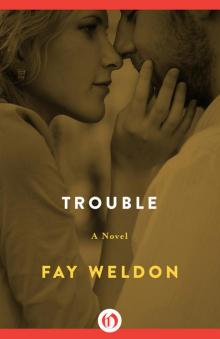 Trouble
Trouble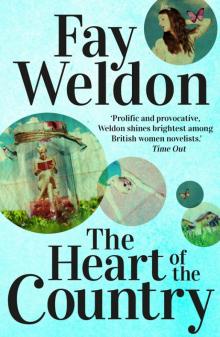 The Heart of the Country
The Heart of the Country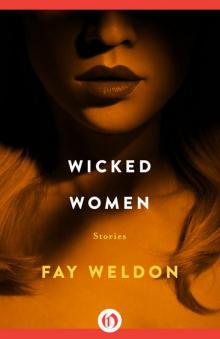 Wicked Women
Wicked Women Mischief
Mischief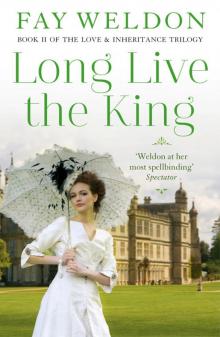 Long Live the King
Long Live the King Remember Me
Remember Me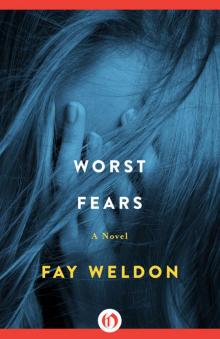 Worst Fears
Worst Fears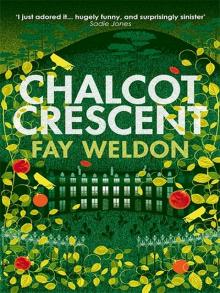 Chalcot Crescent
Chalcot Crescent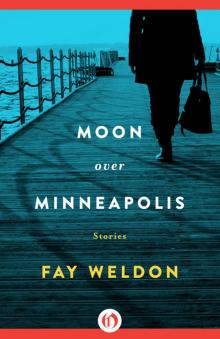 Moon Over Minneapolis
Moon Over Minneapolis The New Countess
The New Countess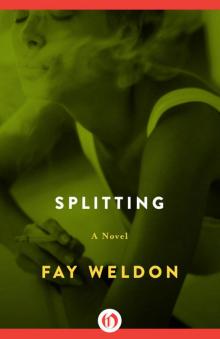 Splitting
Splitting After the Peace
After the Peace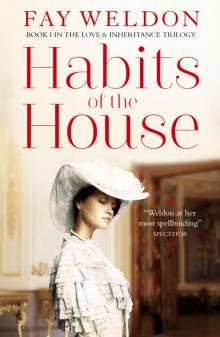 Habits of the House
Habits of the House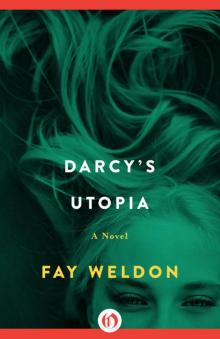 Darcy's Utopia
Darcy's Utopia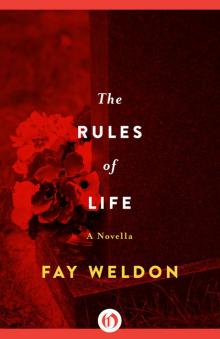 The Rules of Life
The Rules of Life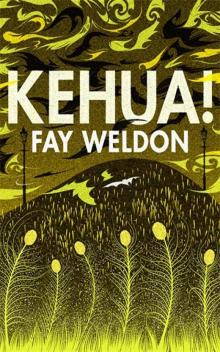 Kehua!
Kehua! Before the War
Before the War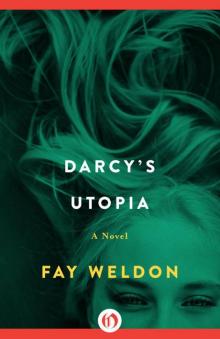 Darcy's Utopia: A Novel
Darcy's Utopia: A Novel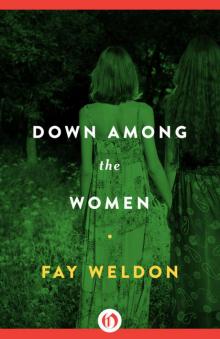 Down Among the Women
Down Among the Women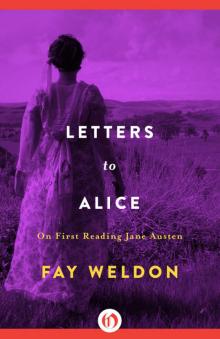 Letters to Alice
Letters to Alice 3 Great Historical Novels
3 Great Historical Novels Female Friends
Female Friends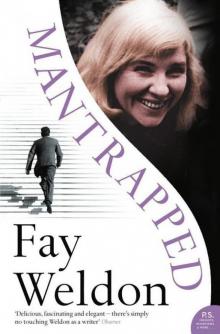 Mantrapped
Mantrapped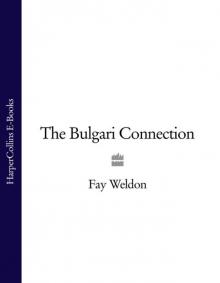 The Bulgari Connection
The Bulgari Connection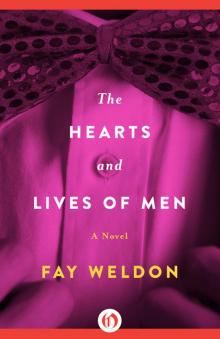 The Hearts and Lives of Men
The Hearts and Lives of Men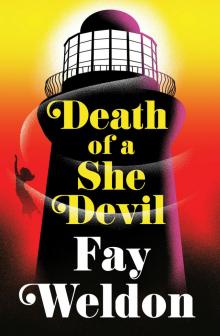 Death of a She Devil
Death of a She Devil